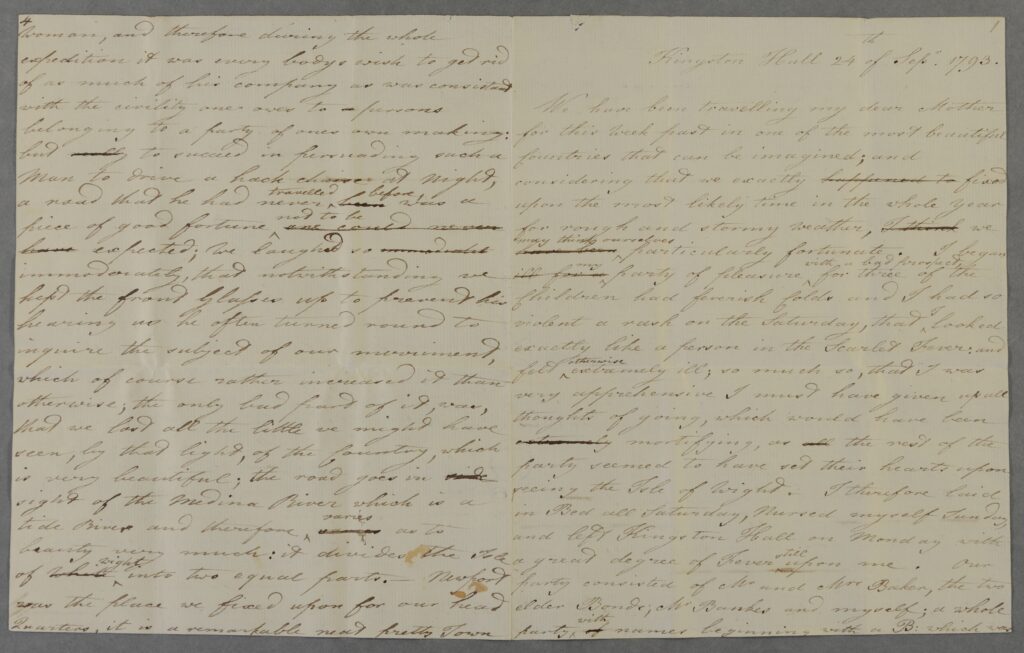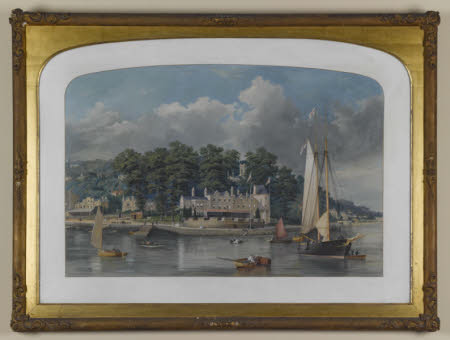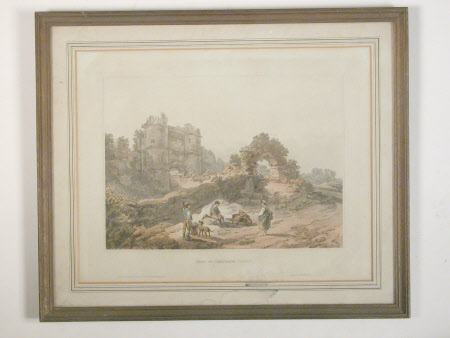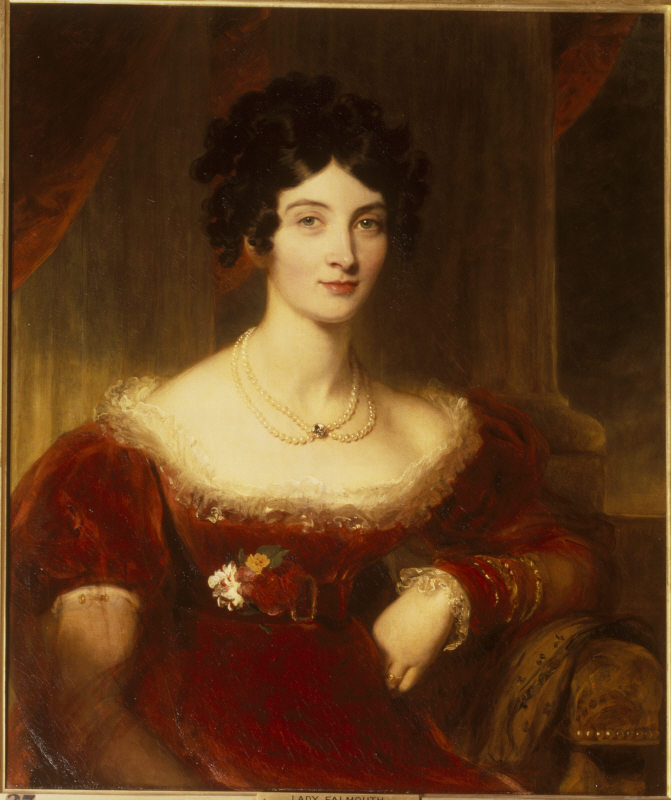Between 2015 and 2018 Dorset History Centre undertook the ‘Unlocking the Bankes archive‘ project. During the life of this project, staff and volunteers contributed well over 100 blogs to the project website. By 2024, this project website was no longer functional in the way it originally was, and we made the decision to close the website permanently.
However, we didn’t want to lose all of the intriguing stories and individual research which had been done by so many people, and we are therefore going to slowly be recycling these pieces onto this blog site going forward, to ensure that these fascinating tales have a home for people to read (or possibly re-read)!
This time we take a look at a holiday undertaken by Frances Bankes in 1793…
—
Frances Bankes (1760- 1823) – wife of Henry Bankes the younger, and mother of six children including William – was an enthusiastic correspondent. She appears to have enjoyed a friendly relationship with her mother-in-law, Margaret Bankes, who lived in Westminster. The Bankes Archive contains many of Frances’s letters to Margaret in which she describes family matters and interesting events in lively detail.
One particular letter from Frances to her mother-in-law, dated 24th September 1793 (D-BKL/H/G/4) gives a fascinating account of the first three days of a trip to the Isle of Wight. Over 12 pages, Frances pours out an amazingly frank account of the minutiae of her trip. The letter also gives us glimpse of her charismatic personality and strong opinions, which one cannot help but love!

This blog post describes the first days of that memorable holiday to – in Frances’s words – “one of the most beautiful countries that can be imagined”. You will learn how to holiday in style!
DAY ONE – MONDAY: Travel and Arrival
Key Events:
Ferry Passage à Dinner à Travelled to Lodgings à Arrival at Newport
Setting out: “Our party consisted of Mr and Mrs Baker, the two elder Bonds, Mr Bankes and myself; a whole party with names beginning with a B: which was whimsical enough. We left this place [Kingston Hall] about nine o’clock, Mrs Baker and the Bonds, and Mr Bankes in the Coach; and Mr Baker and I in the Curricle. . . . As Ladies maids in general give a thousand times more trouble than their mistresses, Mrs Baker and I agreed to leave ours behind, we took no Carriage across the water, nor any Horses, except three Ponys, which the Gentlemen found very useful. All our Beaux threatened us with being dreadfully sick if the Water was in the smallest degree rough, it was very lucky that we went over as smooth as possible and had a very short passage; none of the Gentlemen’s stomachs were therefore incommoded by the voyage, and we landed all very hungry at Cowes about four”.
First impressions of Cowes: “There are some Houses at this place very pleasantly situated near the sea, there is a little Fort which the sea almost surrounds, which I should like to live in extremely; but the Town in general appears dirty, and the streets are extremely narrow…”

Dinner at an inn was not as smooth, or as palatable, as the ferry passage: “the Inn is detestable, they gave us nothing for dinner, but stinking Whitings, tough mutton, and soft Beef; which … I could not bring myself to eat”.
Travel to their lodgings: Frances describes how they hired two hack chaises and persuaded Mr Baker to drive one of them, instead of the postilion: “it was every bodys wish to get rid of as much of his company as was consistent with the civility one owes to persons belonging to a party of ones own making: but to succeed in persuading such a man to drive a hack chaise at night, a road that he had never travelled before was a piece of good fortune not to be expected; we laughed so immoderately, that notwithstanding we kept the front Glasses up to prevent his hearing us he often turned round to inquire the subject of our merriment, which of course rather increased it than otherwise”!
Newport “was the place we fixed upon for our head Quarters, it is a remarkable neat pretty Town the only disadvantage, is its not being near the sea… but its central situation, suited us on as other accounts made our journeys easier… and the accommodations are better than at Cowes: tho’ at Newport, the Kitchen and Larder were both in the centre of the House, the latter up one pair of stairs; and we both saw and smelt our victuals in all stages which to my sick stomach was an unpleasant circumstance, it however did upon the whole extremely well.”
Top tip from Frances:
- Leave your ladies’ maids behind because they “in general give a thousand times more trouble than their mistresses”!
DAY TWO – TUESDAY: Touring the Locale
Key Events:
Carisbrooke Castle & Ryde
Carisbrooke Castle was the first port of call that day. Frances wrote that, “They show you the Window at which King Charles attempted to make his escape, and the stone floor of that apartment, is tolerably whole, tho’ the sides and roof are gone, we went up eighty steep steps into the Citadel where there is a fine view, and that wall is pretty intire: the greatest curiosity in the castle is a well three hundred feet deep, the water of which we drank some is uncommonly fine, and will keep an East India voyage like the Bristol water. It is drawn by one single ass, who turns round an immense wheel with as much ease as possible, it must be a fine wholesome exercise for the last ass lived two and forty years, and the one we saw has constantly brought up nine Buckets a day for two and twenty years, and looks now in high preservation.”

According to Frances, the current decorations and maintenance of the castle were not fitting – “The castle is much disfigured by the extreme want of taste of the present Governor of the Island Mr Ord, who has a house within the ruins which he has modernized and whitened; he has likewise built to add to his offices, several flaming brick walls which make a most frightful appearance, and to complete his plan, he is going to make a little Green House directly under the apartment where the King was confined. …..”.
However, the party’s guide provided an interesting diversion:
The Death of General James Wolfe (1727-1759), after Benjamin West. © NT Images. This is probably the engraving that Frances and her party were shown.
“We were shown the Castle by an old soldier who desired us to walk into his room, that he might show us the ornaments which he himself had taken off a Cherokee chief on the day that General Wolf was killed, and upon looking at the man we found him to be the Sergeant drawn in Wests Picture of the Generals death …. “
The party’s final visit of that day was to Ryde – “a pretty village on the sea shore”. Frances says little about Ryde, but does mention that, “While we were at Ride a violent storm of rain came on, but as we were unwilling to give up the plan for that day, we agreed, to dine in a little public House at Ride, and take our chance of its clearing up, which it did not do and, we were obliged to return in our whiskeys to Newport and were all most completely wet thro’.”
A page of Frances’s letter, describing the visit to Ryde
Top tip from Frances:
- Take your umbrella when you go to the Isle of Wight !
DAY THREE – TUESDAY: Touring the Locale
Key Events:
Mr Bankes visits friends > Dinner invitation > Exclusive Tour
Mr Bankes visits friends: on the Wednesday, “it rained all the morning, but not very hard, and Mr Bankes wishing to pay his old friend Sir John Barrington a visit, thought this a good opportunity”.
Dinner invitation: “when he [Mr Bankes] returned… he told me that Sir Richard Worsley and his son were to dine with Sir John Barrington that day, and that he rather made a point of our meeting them, tho’ we regretted extremely leaving the rest of our party, we thought as he had showed us such very great civility when we were in the Isle of Wight before we could not well avoid accepting his invitation.”

Preparation: “I therefore set about dressing my hair which was to me no small difficulty, and having furbished myself up as well as I was able without assistance, we set off in a Hack Chaise for Sir John Barrington’s, where, notwithstanding the curious figure I had dressed myself, I certainly made a conquest that turned out very useful to the rest of the party.”
The Dinner: “Sir Richard Worsley*, is a very odd, particular man, who never allows strangers let their rank be what it will to see his House and as to his Cottage, or Gems, Mr Tollmach” [WilbrahamTollemache] “told me he believed that no body in the Isle of Wight had ever seen them; nor indeed any living creature except the friends who were staying in the House with him, Mr Tollmach tho’ a near relation of his, and living within two miles had never been shown any of his curiosities, so that of course, Mr Bankes and I not being in the least acquainted with him, had no hopes of being admitted to such an honor. However, it turned out quite otherwise, for meeting him at Sir John Barringtons, either, from knowing that Mr Bankes understood pictures & Gems particularly well, or, from having taken a fancy to me which from his great attention I am willing to flatter myself was the case, he told us, that if we would being all our party the next morning to Apuldercombe, (which is the name of his place) he would himself show us everything worth seeing, and there take us to his Cottage, which he took care to tell me was a thing he had never done before: but as there was a great deal to be seen there worth describing, I think my dear mother I shall put off writing the conclusion of our little tour till tomorrow, as I think twelve sides of paper a pretty long letter for one days post.”
Appuldurcombe Park, the seat of Sir Richard Worsley, 1781
Top tips from Frances:
- Ladies – pack your best frocks, looks matter!
- Gentlemen – it’s all about who you know!
—
Like many a modern-day writer, Frances knew the trick of a cliff-hanger! If you’d like to find out more or follow-up her correspondence, come and visit us at the Dorset History Centre, where her letters are cared for.
—
* Sir Richard Worsley, (1751–1805), had been MP for Newport and was a supporter of the North administration. His political career was badly damaged by the very public collapse of his marriage with Seymour Dorothy, who became infamous for her numerous affairs. The couple separated formally in 1788, by which time Sir Richard had quitted England. He travelled in Spain, Portugal, France, Italy, and then extensively through the Levant between 1785 and 1788. During his travels Worsley made a remarkable collection of statues, reliefs, and gems, which he arranged at his house at Appuldurcombe. It included the most important collection of Greek marbles yet seen in England.
In 1798 he issued the first part (dated 1794) of Museum Worsleyanum, a sumptuous illustrated description of his collection. The cost of part one, exclusive of binding, was an astonishing £2,887 – 4s. Part two came out in 1802. It is still regarded as a very important piece of scholarship.

